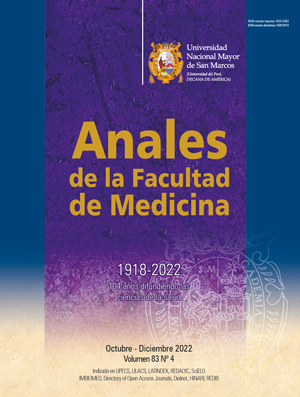Cuestionario de representaciones de la menopausia: adaptación y propuesta de versión en español
DOI:
https://doi.org/10.15381/anales.v83i4.24332Palabras clave:
Menopausia, Estudio de Validación, Traducción, Encuestas y CuestionariosResumen
Introducción. El envejecimiento de la mujer es un evento natural denominado menopausia que requiere su estudio por las diversas manifestaciones y como estas influyen durante su vida. Objetivo. Realizar el diseño y adaptación cultural del cuestionario de representaciones de la menopausia versión en español mediante pruebas de validez y confiabilidad. Métodos. Investigación de adaptación y diseño de validación de cuestionario, participaron mujeres entre 42 a 65 años, atendidas en establecimientos del primer nivel de atención. Se utilizó una muestra aleatoria conformada por 230 mujeres y se consideró la versión en inglés de Menopause Representations Questionnaire para la adaptación. Se realizó la traducción inversa, validez de contenido mediante juicio de expertos, validez convergente a través del coeficiente de correlación de Spearman, análisis de consistencia interna mediante el coeficiente de Alfa de Cronbach y análisis factorial confirmatorio mediante la adecuación de muestra de Kaiser-Meyer-Olkin. Resultados. La edad promedio fue 52,87 ± 6,29 años. La traducción mantuvo el significado de palabras originales, en la valoración de la compresión no se presentaron modificaciones. La validez de contenido presentó un valor de 0,79 según coeficiente de Kappa. Todas las dimensiones mostraron correlación significativa para la validez convergente, la confiabilidad en las cuatro dimensiones osciló entre 0,68 y 0,79 y una confiabilidad total de 0,80. No fue necesario eliminar preguntas y se aceptó el análisis confirmatorio. Conclusión. Es la primera versión traducida al español, tiene una validez y confiabilidad aceptable, puede ser utilizado en intervenciones clínicas y estudios epidemiológicos y útil para describir experiencias desde la perspectiva bio-psicosocial y cultural.
Descargas
Publicado
Número
Sección
Licencia
Derechos de autor 2022 Anales de la Facultad de Medicina

Esta obra está bajo una licencia internacional Creative Commons Atribución-NoComercial-CompartirIgual 4.0.
Aquellos autores/as que tengan publicaciones con esta revista, aceptan los términos siguientes:
- Los autores/as conservarán sus derechos de autor y garantizarán a la revista el derecho de primera publicación de su obra, el cuál estará simultáneamente sujeto a la Licencia de reconocimiento de Creative Commons que permite a terceros compartir la obra siempre que se indique su autor y su primera publicación esta revista.
- Los autores/as podrán adoptar otros acuerdos de licencia no exclusiva de distribución de la versión de la obra publicada (p. ej.: depositarla en un archivo telemático institucional o publicarla en un volumen monográfico) siempre que se indique la publicación inicial en esta revista.
- Se permite y recomienda a los autores/as difundir su obra a través de Internet (p. ej.: en archivos telemáticos institucionales o en su página web) antes y durante el proceso de envío, lo cual puede producir intercambios interesantes y aumentar las citas de la obra publicada. (Véase El efecto del acceso abierto).



